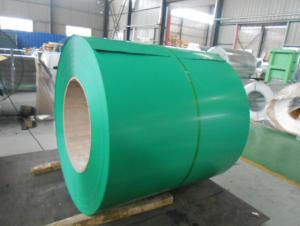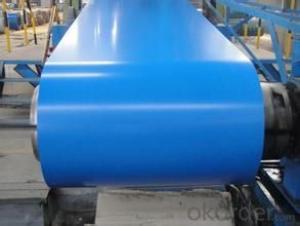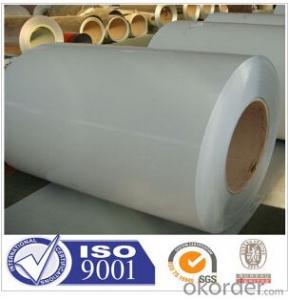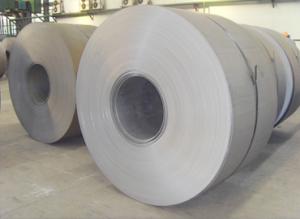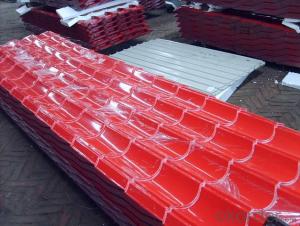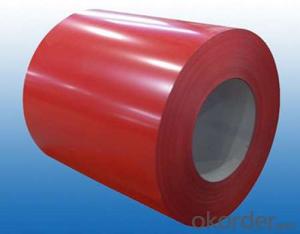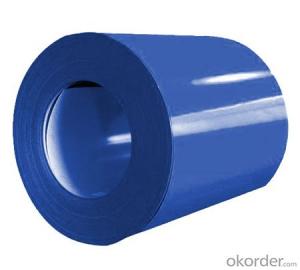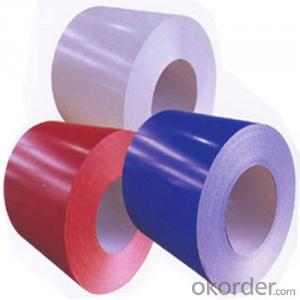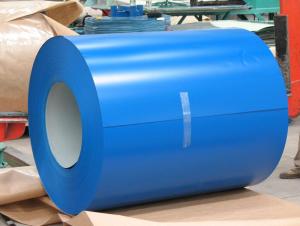PREPAINTED GALVANIZED STEEL COILS
- Loading Port:
- Tianjin
- Payment Terms:
- TT OR LC
- Min Order Qty:
- -
- Supply Capability:
- 5000 m.t./month
OKorder Service Pledge
Quality Product, Order Online Tracking, Timely Delivery
OKorder Financial Service
Credit Rating, Credit Services, Credit Purchasing
You Might Also Like
PRE-PAINTED GALVANIZED STEEL COIL
ZINC COATING:60g/m2 (-/+10g/m2)
STANDARD:JIS G 3312
TOP COATING:5+13 micron;5-7 micron
STEEL GRADE:HARD QUALITY (75-90hrb)
COIL WEIGHT:3-6 ton COIL ID:508mm
0.45(tct)*925mm*C 310-315m TOLERANCE: THICKNESS:-/+0.02mm; WIDTH:0/5mm.
COLOR:TRAFFIC GREEN
- Q: Are steel coils used in HVAC systems?
- Yes, steel coils are commonly used in HVAC systems. They are used in air conditioning units and heat pumps to transfer heat between the refrigerant and the surrounding air, thereby cooling or heating the space. Steel coils are efficient in heat exchange due to their high thermal conductivity and durability.
- Q: I got my dog those nice looking stainless steel water and food bowls (looks great next to my kitchen appliances...haha). The thing is my dog will drink from the toilet or a plastic bowl but not out of his bowl...I was wondering if those stainless steel bowls change the taste of food and water?
- Personally I use stainless steel for my own dogs because ti is easy to keep clean, and doesn't weigh too much when I am carrying 3 large bowls full of food. Plus when I drop them they don't break. The only reason I don't use plastic is because my dogs like to chew anything plastic :P I use plastic for my foster cats and foster puppies and have never had any sort of infection. Personally I think that is some sort of myth as I have never known anyone's pet to get an infection from a plastic bowl. As long as you keep them clean, plastic or stainless are both fine
- Q: What are the different coil leveling machine configurations used for steel coils?
- Steel coils can be processed using various coil leveling machine configurations, each designed to meet specific requirements. One commonly used configuration is the four-high leveling machine, consisting of a stack of four leveling rolls. These rolls apply pressure to flatten and level the steel coil. This configuration is ideal for thicker and heavier coils, as it offers greater pressure and control. Another option is the six-high leveling machine, which comprises two stacks of three leveling rolls each. The steel coil passes through the first stack for initial leveling and then through the second stack for further refinement. This configuration is suitable for thinner coils, allowing for a more precise and gentle leveling process. Additionally, combination leveling machines are available, integrating leveling with other processes like slitting or shearing. These machines provide a comprehensive solution for steel coil processing, particularly in applications requiring multiple steps to achieve the desired final product. Choosing the right coil leveling machine configuration depends on factors such as coil thickness, weight, desired precision, and efficiency. Manufacturers and processors must carefully assess their specific needs to select the appropriate configuration, ensuring optimal results in the steel coil leveling process.
- Q: How are steel coils used in appliances?
- Steel coils are commonly used in appliances as a key component in the manufacturing of various parts such as heating elements, motors, compressors, and springs. These coils provide durability, strength, and flexibility to ensure the efficient functioning of appliances like refrigerators, washing machines, air conditioners, and stoves.
- Q: Alright...Please tell me what I can and can't buy for Steel Legion in detail(Much Detail please)Ogryns.Las canons.The problem I'm having is that they don't have steel Legion Uniform..does it matter?1.I also heard that you can't use Commisar Yarrick.(So what could I use?)2.What are my Hq choices,Fast attack,Heavy Support,Elite etc.3.Steel Legion has a Commisar....(Do I buy one for each squad of Steel Legion or one?)Please in detail what should I buy...I don't have the codex yet but will soon!!4.I also heard that if I get Steel Legion I need a transport for everything?(Is this true?)5.Please be detail on what i can't and can buy!!(Please like HQ Squad leader,Sargent)
- here are a couple of things about the steel legion. you should have a lot of mechanized units, have chimaras for rvery squad if posible, artillery fire helps a hell of a lot. also sentinals and leman russes and hell hounds also help. if in apocolypse, use banblades and titans. storm trooper squads should be your base squadrons. put them in chimeras and get near the action, drop 'em off and rapid fire like CRAZY!!! the steel legion loves heavy weapons so remember to get some heavy weapons platforms. there favourite weapons are grenade and missle launchers. there is also an officer you can buy with a power sword with the steel legion look. steel legion are big xeno hunters. because commisar is a ork killer you should be allowed to field him. ratling/ sniper squads also help and if you can get a vindicare assassin that is very useful.
- Q: Steel being my favorite type, I just picked up Heart Gold today, my gf got Soul Silver...I was wondering which steel types are available and somewhat easily obtainable in HG (and/or what is the earliest steel type I can get?)
- for me would be steelex but u have to get onix and get him to level fifty and trade with a friend and he will evolve into steelex as long as your friend gives it back to you lol
- Q: I've played guitar for years, now I want a steel guitar. As a beginner, to learn and experiment with, which one would be better for me?
- Pedal steel is very difficult. You need to co-ordinate both hands, both feet and both knees to play it effectively. Lap steel is a lot easier. I suppose it depends how much of a challenge you want. A good lap steel guitar is usually cheaper than a good pedal steel too, so that's another consideration to take into account.
- Q: How are steel coils used in the manufacturing of construction materials?
- Steel coils are used in the manufacturing of construction materials as they are rolled into sheets or strips, which can then be shaped and formed into various structural components such as beams, columns, and frames. These coils provide the necessary strength and durability required for constructing buildings, bridges, and other infrastructure projects.
- Q: I have taylormade burner steel irons and I was wondering what would the flex of steel be if you were to compare it to graphite shafts, like regular, stiff, super stiff, etc...THANKS!!!!!!!!!!!!!!!!!!!!!!!!!!!!!!!!!!!!!!
- If i understand you correctly, i think you misunderstand shafts. Steel shafts vs. graphite shafts these days is more of a competition of weights, not flexibility. Both steel and Graphite have different flex profiles available from Ladies (L) to super stiff (X). Graphite may feel a little more whippy than steel because of the lighter weight. Shafts will vary by company as well. Stiff from True temper may not be as stiff as one from Aldila, or vice verse. You can also make a shaft play stiffer or more flexible by where you cut the length. This is called tipping. Take more from the bottom and it will be stiffer, more from the grip end and it will play more flexible.
Send your message to us
PREPAINTED GALVANIZED STEEL COILS
- Loading Port:
- Tianjin
- Payment Terms:
- TT OR LC
- Min Order Qty:
- -
- Supply Capability:
- 5000 m.t./month
OKorder Service Pledge
Quality Product, Order Online Tracking, Timely Delivery
OKorder Financial Service
Credit Rating, Credit Services, Credit Purchasing
Similar products
Hot products
Hot Searches
Related keywords
